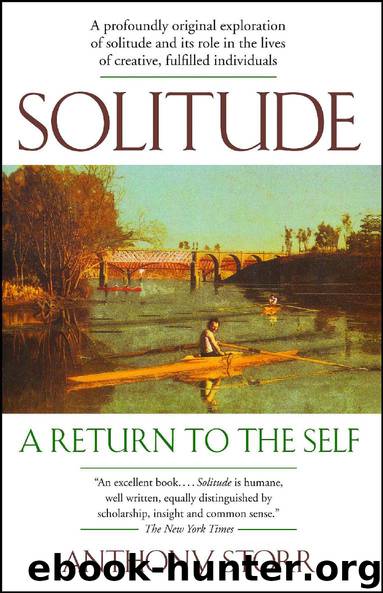Solitude a Return to the Self by Anthony Storr

Author:Anthony Storr
Language: eng
Format: epub
Publisher: Simon & Schuster
Published: 2015-05-19T00:00:00+00:00
9
Bereavement, Depression and Repair
‘Writing is a form of therapy; sometimes I wonder how all those who do not write, compose or paint can manage to escape the madness, the melancholia, the panic fear which is inherent in the human situation.’
Graham Greene
‘But seriously I wonder whether for a person like myself whose most intense moments were those of depression a cure that destroys the depression may not destroy the intensity – a desperate remedy.’
Edward Thomas
In the preceding chapter, we concluded that some writers are impelled to develop their imaginative capacities as a compensation for the absence of, or severance of, intimate relationships with parents. In this chapter, I want to pursue the idea that imagination is able to do more than create compensatory castles in the air, or retreats from unhappiness. Creative imagination, as the quotation from Graham Greene given above suggests, can exercise a healing function. By creating a new unity in a poem or other work of art, the artist is attempting to restore a lost unity, or to find a new unity, within the inner world of the psyche, as well as producing work which has a real existence in the external world. In Chapter 5, reference was made to the fact that people who realize their creative potential are constantly bridging the gap between the world of external reality and the inner world of the psyche. In Winnicott’s phrase, ‘creative apperception’ is what makes individuals feel that life is worth living; and those who are gifted are perhaps more able than most to repair loss in symbolic fashion. The human mind seems so constructed that a new balance or restoration within the subjective, imaginative world is felt as if it were a change for the better in the external world, and vice versa. In thus linking objective and subjective, we are approaching the limits of human understanding; but I believe that the secrets of human creative adaptation are to be found at just those limits. The hunger of imagination which drives men to seek new understanding and new connections in the external world is, at the same time, a hunger for integration and unity within.
Of the writers whose lives were examined in the last chapter, Saki was least able to overcome the traumata of his early childhood. He was also the only one of these particular writers to be permanently deprived of his mother by her death when he was only two years old. In this chapter, I want to examine the relation between creativity and depression. Since bereavement, and specifically early bereavement, is not only a precipitant of depression at the time, but seems often to predispose the sufferer to react to any later losses with particular severity, the complex relation between bereavement, depression and creative achievement will be outlined.
Although separation from both parents is a traumatic event for any young child, we may suppose that, so long as the child knows that they are still alive, he will continue to entertain hopes of being reunited with them.
Download
This site does not store any files on its server. We only index and link to content provided by other sites. Please contact the content providers to delete copyright contents if any and email us, we'll remove relevant links or contents immediately.
Rewire Your Anxious Brain by Catherine M. Pittman(18625)
Talking to Strangers by Malcolm Gladwell(13335)
The Art of Thinking Clearly by Rolf Dobelli(10397)
Mindhunter: Inside the FBI's Elite Serial Crime Unit by John E. Douglas & Mark Olshaker(9304)
Becoming Supernatural by Dr. Joe Dispenza(8188)
Change Your Questions, Change Your Life by Marilee Adams(7722)
Nudge - Improving Decisions about Health, Wealth, and Happiness by Thaler Sunstein(7683)
The Road Less Traveled by M. Scott Peck(7576)
The Lost Art of Listening by Michael P. Nichols(7482)
Mastermind: How to Think Like Sherlock Holmes by Maria Konnikova(7307)
Enlightenment Now: The Case for Reason, Science, Humanism, and Progress by Steven Pinker(7294)
Win Bigly by Scott Adams(7176)
The Way of Zen by Alan W. Watts(6580)
Daring Greatly by Brene Brown(6492)
Big Magic: Creative Living Beyond Fear by Elizabeth Gilbert(5730)
Grit by Angela Duckworth(5583)
Ego Is the Enemy by Ryan Holiday(5396)
Men In Love by Nancy Friday(5219)
The Laws of Human Nature by Robert Greene(5139)
